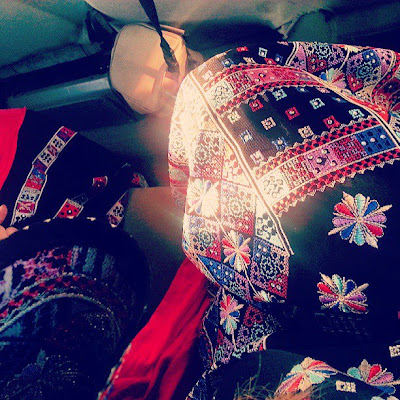Dear friends,
my friend Katerina is currently in Palestine and she has been sending back some beautiful, amazing and moving photos. She has given me permission to post some of her photos here.
in solidarity, Kim
***

Original keys from those who fled their homes in 1948, which they took with them because they intended to return. Though they still wait in the camp to return to their homes 65 years later, now most of their villages don't exist anymore as they have been renamed and inhabited by Israel - Aida Refugee Camp, Occupied Bethlehem

How to stop illegal Israeli settlers who live on top of Palestinian shops from throwing rubbish onto Palestinians below. Occupied Hebron, Palestine
my friend Katerina is currently in Palestine and she has been sending back some beautiful, amazing and moving photos. She has given me permission to post some of her photos here.
in solidarity, Kim
***
Palestinian anti-occupation artwork
Palestinian embroidery
Qalandia checkpoint sign, Occupied West Bank
Qalandia Checkpoint, Occupied West Bank
Ramallah Street view, Occupied West Bank
Israeli colony of Halamish, Occupied West Bank
The home of a Palestinian friend, Occupied West Bank
Sweets and gifts for a Palestinian friend's birthday celebration
Donkey in field, Occupied Bir Zeit
Return key, Aida Refugee Camp, Occupied Bethlehem
Mural painted on Apartheid Wall - Aida Refugee camp, Occupied Bethlehem

Original keys from those who fled their homes in 1948, which they took with them because they intended to return. Though they still wait in the camp to return to their homes 65 years later, now most of their villages don't exist anymore as they have been renamed and inhabited by Israel - Aida Refugee Camp, Occupied Bethlehem
Original suitcases used by Palestinians who fled their homes in 1948 - Aida Refugee Camp, Occupied Bethlehem
Apartheid Wall - Occupied Bethlehem
Aida Refugee camp wall, Occupied Bethlehem
Abandoned
shops in a once bustling city. Palestinians left due to harassment from
illegal Israeli settlers and Israeli occupation forces. Occupied Hebron, Palestine
Rusted tin barriers, Occupied Hebron
Occupied Hebron, Palestine
Mosque of Ibrahim (Abraham), where Rebekah, Sarah, Abraham and Rachel are buried.
Occupied Hebron, Palestine.
The tomb of Ibrahim/Abraham. Muslims can only look from this side, Jewish worshippers
only from the window on the other side, Occupied Hebron, Palestine
85
year old mufti whose mosque and home, once next to each other, are now
separated by the apartheid wall built by Israel 3 yeas ago. He must now
go through checkpoints to move between the two. - Occupied Hebron, Palestine.

How to stop illegal Israeli settlers who live on top of Palestinian shops from throwing rubbish onto Palestinians below. Occupied Hebron, Palestine
Occupied Hebron, Palestine





















